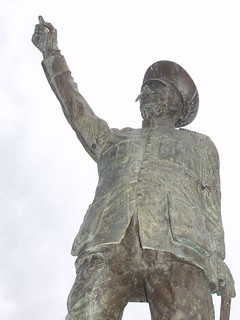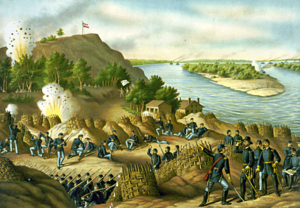 |
| Juan Vicente Gómez |
Venezuela also provided the Allies with
petroleum during World War II and, after the attack on Pearl Harbor,
severed diplomatic relations with Italy, Germany and Japan. However,
Venezuela did not formally declare war on Germany and the rest of the
Axis countries until 1945, the last year of the war. The conflict
came close to Venezuelan soil in 1942, when German submarines
attacked oil refining facilities on the island of Aruba, 17 miles off
Venezuela's northern coast. The Venezuelan steamship, Monagas, was
one of the ships sunk in the attack. However, following the death of
Gomez, Venezuela was preoccupied with internal
struggles until 1948 when a military junta seized power and
ruled until the overthrow of its leader, Marcos Pérez Jiménez,, in
1958.
| Siege of Vicksburg (Photo credit: Wikipedia) |
A
short time afterward, I was surprised to learn that my own
great-great-grandfather, had left just such an account. His name was
George Kurth (1834-1897) and he was one of the
1,463 men who served in the 18th Wisconsin Infantry Regiment. The
18th
Wisconsin Infantry was organized at Camp Trowbridge in Milwaukee
and mustered into service on March 15, 1862. The regiment left
Wisconsin for St. Louis, Missouri, on March 30, and then traveled to
Pittsburg Landing, Tennessee, from March 31-April 5. During the
war it moved through Tennessee, Mississippi, Louisiana, Alabama,
Maryland, the Carolinas, and Washington D.C. via Virginia. The
regiment participated in the battles of Shiloh,
Corinth, Iuka, Port Gibson, Champion Hill, and the
Siege of Vicksburg.
In the fall of 1864 new recruits were
attached to the 93rd Illinois Infantry Regiment from November 1864
until April 1865, and participated in Sherman's March to the Sea, the
Siege of Savannah, the campaign of the Carolinas, and the Battle of
Bentonville, North Carolina. Veterans who re-enlisted in the fall of
1864 were ordered to Nashville, Tennessee, on December 28, 1864 and
participated in the advance on Raleigh, North Carolina, and the
surrender of the Confederate army. The regiment moved to
Louisville, Kentucky, in June 1865, and there mustered out on July
18, 1865. The regiment lost 225 men during service. Four officers and
52 enlisted men were killed or mortally wounded. Two officers and 167
enlisted men died from disease.
I was
impressed by my great-great-grandfather's accounts of the regiment
being reviewed by General Ulysses S. Grant, the battle of Vicksburg,
and, sometime after Vicksburg, being taken prisoner by the
Confederates and later escaping from the POW camp.
But
most of all I was impressed with how he confessed his faith in Jesus
Christ and how that sustained him when men, many of them who had
become his close friends, were being struck down to his left and to
his right. George Kurth was born in Germany, but his parents brought
him to the United States when he was a small child. He spent of his
early life in southwestern Wisconsin and joined the Union Army mainly
in a spirit of adventure. He wanted to “see something of the
world.” Later he would be happy to return to the family farm near
Whitehall, Wisconsin, and he would conclude his account of the Civil
War by stating that he had learned of the brevity and preciousness of
human life. He urged his children and all of his descendants to focus
on “the things of eternity” and not on the passing pleasures of
this life.
I
thank God that my great-great-grandfather took up arms in defense of
liberty and left us the legacy of faith.



No comments:
Post a Comment